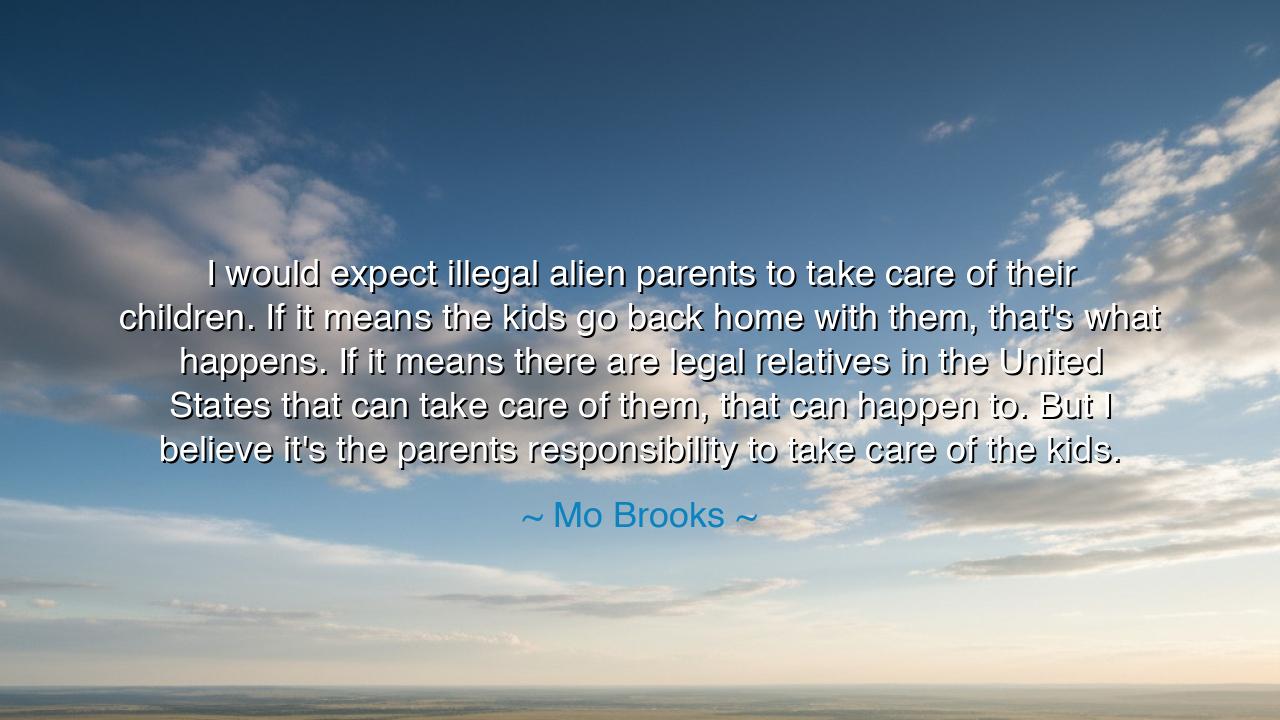
I would expect illegal alien parents to take care of their
I would expect illegal alien parents to take care of their children. If it means the kids go back home with them, that's what happens. If it means there are legal relatives in the United States that can take care of them, that can happen to. But I believe it's the parents responsibility to take care of the kids.






When Mo Brooks declared, “I would expect illegal alien parents to take care of their children. If it means the kids go back home with them, that’s what happens. If it means there are legal relatives in the United States that can take care of them, that can happen too. But I believe it’s the parents’ responsibility to take care of the kids,” he spoke not only as a lawmaker but as a voice echoing an ancient tension between duty and mercy, law and love. His words draw a line between compassion and accountability — a line that civilizations have wrestled with since the dawn of organized society. Beneath the surface of politics lies a deeper moral question: Where does the responsibility of a parent end, and where does the obligation of the state begin?
In the world of the ancients, the family was the first kingdom. Before laws were written on tablets of stone, they were carved upon the hearts of mothers and fathers. It was understood that to bring forth a child was to accept a lifelong covenant — to nurture, to protect, and to guide. What Brooks expresses, in his modern and political way, is this same ancient principle: that parents bear the sacred duty for the welfare of their children, no matter where they dwell or what trials they face. Whether in the deserts of Mesopotamia or the streets of modern cities, the burden and blessing of parenthood remain unchanged.
Yet his words also reveal the complexity of migration and exile, of those who cross borders in search of hope. Throughout history, families have uprooted themselves from famine, war, or tyranny, carrying their children into foreign lands with trembling hearts and unbroken faith. But in every age, there have been rulers and lawmakers who faced the dilemma of how to balance compassion for the stranger with loyalty to the law. The Greeks spoke of this in their tragedies, where mercy and order were always at odds. And today, Brooks’s quote reflects that same eternal struggle: how to uphold the rule of law while recognizing the humanity of those who live outside it.
Consider, for a moment, the story of Moses’s mother, who placed her infant in a basket to save him from Pharaoh’s decree. In that desperate act lay both love and surrender — the recognition that a parent’s responsibility extends beyond comfort to courage. She could not protect him in her arms, but she found a way to protect him in the world. So too, when Brooks speaks of parents taking responsibility for their children, he evokes that timeless truth: that parenthood demands sacrifice and resolve, even in the face of exile or return. It is not the government, nor the law, that bears this sacred trust — it is the heart of the mother and father.
Still, one must listen beneath the firmness of Brooks’s tone to the moral unease within it. For while he insists on personal responsibility, his words raise a haunting question — what becomes of children when love and law collide? When parents are deported, and children are left behind in a land they call home, the soul of a nation is tested. History reminds us that justice without mercy hardens into cruelty, just as mercy without justice dissolves into chaos. A wise society must seek the narrow path between them — to uphold law with firmness, yet administer it with humanity.
Brooks’s statement, though rooted in modern debate, touches a universal truth: that order cannot exist without personal responsibility, and compassion cannot endure without limits. He calls for a return to the foundational belief that parents, not governments, must be the first guardians of their children’s fate. But his words also challenge us to look beyond punishment and policy — to ensure that in the pursuit of justice, we do not forget the innocence of the child, whose only crime is being born into uncertainty.
The lesson here is twofold. To parents: never surrender your duty, for no border or law can absolve the sacred bond between you and your child. To nations: temper justice with mercy, for the strength of a people is not shown in how strictly they enforce their laws, but in how wisely they balance them with compassion. In the end, a society’s greatness lies not in its power to divide, but in its wisdom to discern — to see both the rule and the heart, both the parent and the child, both the citizen and the human being.
Thus, let future generations remember this teaching: responsibility and compassion must walk hand in hand. For when they are divided, both perish — but when they are joined, they give birth to justice that endures.






AAdministratorAdministrator
Welcome, honored guests. Please leave a comment, we will respond soon